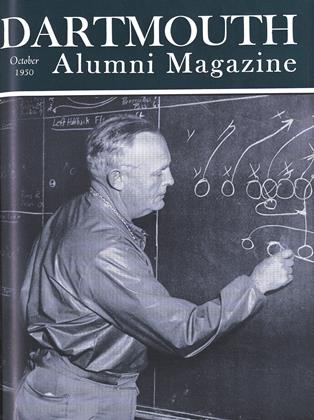by William Howard Brown '16. Lew A. CummingsCo., Manchester, N. H., 1950; 284 pages,$3.50.
Except for the existence of Goffstown, on the Merrimack a little below Manchester, this sturdy New Hampshire patriot until very recently seemed doomed to an unmerited oblivion. The only member of the Goffe familyincluded in the Dictionary of American Biography is William Goffe, the Regicide, who fled from Old England to New England and led a furtive existence here until his death about 1679. In 1899 Gordon Woodbury, a lineal descendant of Col. John Goffe, published a brief biography of his hardy ancestor, but this work was heavily geneological and reached a very limited group. Much more recently a son, George Woodbury, restored John Goffe's old grist mill on Bowman's Brook in Bedford, and in a lively volume entitled John Goffe's Mill did a little more to recall the Colonel's name from the limbo of the lost.
Happily there comes now this full length biography of Colonel Goffe written by a N ,v Hampshire son who has gone over to the Yorkers, but who was born in Goffstown and grew up in the area the Goffe's had done so much to develop. The major theme of the work is a military one, and the author traces in some detail warfare on the New England frontier from Captain John Lovewell's campaign against the Indians in 1725, in which young John Goffe served as an enlisted man, to the campaigns some thirty odd years later which culminated in the elimination of the French on the northern border, and which profited by the able services of John Goffe, now a Colonel in command of a New Hamp shire regiment.
As the sub-title, Eighteenth Century NewHampshire, suggests, the volume naturally includes much material descriptive of life and labor in Provincial New Hampshire. Almost as prominent as the military narrative is the story of the granting of the land and the numerous controversies which developed, along with descriptions of the planting of towns and the gradual settling of the valley. Among the topics that are inevitably part and parcel of the life-story of Col. Goffe are town meetings and law suits, frontier agriculture and primitive industry, church meetings and law suits, fishing and lumbering and road building, and finally the agitation leading to New Hampshire's role in the American Revolution.
The name of Goffe "daughtered out" about one hundred years ago but Mr. Brown is to be thanked for preserving for posterity in worthy fashion both the name and the fame of one of New Hampshire's most worthy sons.
 View Full Issue
View Full Issue
More From This Issue
-
 Sports
SportsFINIS
October 1950 By Bernard G. Sykes '51 -
 Article
ArticleMan on the Job . . . for Thirty Years
October 1950 By JOHN HURD '21 -
 Class Notes
Class Notes1918
October 1950 By ERNEST H. EARLEY, DONALD L. BARR, DAVID L. GARRATT -
 Class Notes
Class Notes1923
October 1950 By TRUMAN T. METZEL, COLIN C. STEWART 3RD, JULIUS A. RIPPEL -
 Class Notes
Class Notes1905
October 1950 By GEORGE W. PUTNAM, GILBERT H. FALL -
 Article
ArticleTHERE'S METHOD Behind the Fall Madness
October 1950 By ROGER K. WOLBARST '43
Allen R. Foley '20
-
 Books
BooksTHAT FAR PARADISE.
May 1960 By ALLEN R. FOLEY '20 -
 Article
ArticleLOCAL GOVERNMENT
MARCH 1963 By ALLEN R. FOLEY '20 -
 Books
BooksAMERICAN FEMINISTS.
NOVEMBER 1963 By ALLEN R. FOLEY '20 -
 Article
ArticleMORE ACROSS THE RIVER
DECEMBER 1963 By ALLEN R. FOLEY '20 -
 Article
ArticleTHREE SENIOR EMERITI: GEIGER – LORD – GOODHUE
DECEMBER 1964 By ALLEN R. FOLEY '20 -
 Books
BooksTHE VOYAGES OF BRIAN SEAWORTHY: AN HISTORICAL ADVENTURE ON LAKE CHAMPLAIN.
NOVEMBER 1971 By ALLEN R. FOLEY '20
Books
-
 Books
BooksEvery Man His Own Robinson Crusoe
October 1943 -
 Books
BooksThe Real Turk
May 1915 By C. H. H. -
 Books
BooksAmerican Trade Unionism
February, 1924 By E. B. W. -
 Books
BooksPRACTICAL HANDBOOK OF INDUSTRIAL TRAFFIC MANAGEMENT
February 1949 By KARL A. HILL '38. -
 Books
BooksBACK WHERE I CAME FROM
April 1939 By Kenneth A. Robinson -
 Books
BooksLIBRARIANS WANTED: CAREERS IN LIBRARY SERVICE.
January 1960 By VIRGINIA L. CLOSE

